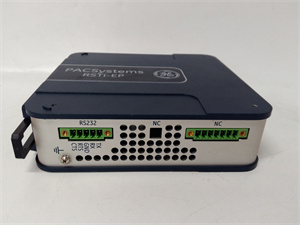
GE EPSCPE100-ABAC is a high-performance upgraded industrial controller produced by General Electric (GE), belonging to the PACSystems RSTi EP series. This controller is renowned for its reliability, flexibility, and performance, comprehensively improving the automation field
Performance: Equipped with advanced processors with powerful computing capabilities, capable of real-time processing of complex control tasks
Structural design: Compact in size, suitable for installation in narrow spaces
Usually, it can seamlessly integrate with other devices in the PACSystems family to build flexible automation systems
High reliability: rigorously tested and suitable for industrial environments with Ethernet
Purpose: Supports multiple programming languages and functional blocks, capable of implementing complex control logic
Product Parameters (Partial)
Processor: High performance processor
Memory: 1MB with configurable data and program memory
I/O points: can be expanded according to configuration
Communication interface: Supports multiple communication protocols, such as DeviceNet Ethernet
Power supply voltage: 24V DC
Working temperature:- 20° C~+60° C
Compliant with standards: Compliant with relevant international standards such as IEC 61131-3
Protection level: Select according to installation environment and requirements
EMC performance: meets EMC requirements and ensures electromagnetic compatibility
EPSCPE100-ABAC belongs to the GE Fanuc PACSystems RSTi EP series, which is known for its high efficiency, flexibility, and agility, and is widely used in various industrial automation fields
Easy programming: supports multiple programming languages, such as ladder diagrams, formatted text, etc
Flexible configuration: It can be flexibly configured according to different application requirements
Openness: Supports multiple communication protocols and can be interconnected with other devices
Logical control: Implement complex control logic, such as sequential control, timed control, etc
Data collection: Collect data from on-site equipment and process it
Human computer interaction: Interacting with operators through HMI devices
Motion control: Control actuators such as servo motors
Comprehensively evaluate the field of industrial automation, such as:
Automotive manufacturing: Automated control of automotive assembly lines
Food and beverage: Automated control of food processing production lines
Packaging industry: automation control of packaging machinery
Loading and unloading: Automated control of loading and unloading systems
Discrete manufacturing: industries such as automotive, electronics, and machinery
Process control: petrochemical, chemical, pharmaceutical and other industries